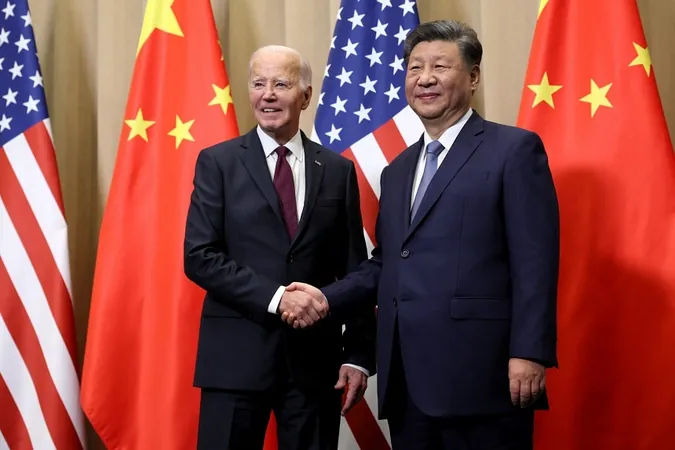
China Intense Diplomatic Push as Trump Prepares for Round Two
2024-11-20
Author: Arjun
China's Diplomatic Maneuvering
In a bold display of diplomatic maneuvering, Chinese President Xi Jinping has launched an aggressive outreach campaign ahead of the anticipated return of Donald Trump to the presidency. This strategic effort comes after world leaders convened in Rio de Janeiro for a Group of 20 summit on November 18, which notably included Xi and Brazilian President Luiz Inácio Lula da Silva in the front row—while U.S. President Joe Biden's late arrival sparked discussions about America's changing global status.
Xi's Engagement with Global Leaders
In the wake of high-profile events in Brazil and the Asia-Pacific Economic Cooperation (APEC) summit in Peru, Xi has engaged in at least 15 vital bilateral meetings with international counterparts, emphasizing China's readiness to strengthen ties amidst speculation about a harsher stance from a potential Trump administration. Experts, like Scott Kennedy from the Center for Strategic and International Studies, predict that China will intensify its diplomatic efforts to gain influence and secure market access, viewing potential tensions with the U.S. as a catalyst for deeper relationships with other nations.
Key Issues in U.S.-China Relations
During a critical meeting with Biden, Xi articulated four "red lines" for U.S.-China relations, underscoring areas of contention including Taiwan, democracy and human rights issues, China's developmental rights, and its political system. This echoes sentiments previously expressed by former Secretary of State Mike Pompeo, who emphasized ideological differences between the two nations.
Biden's Trade Policies and China's Perception
While Biden's administration has inherited and even expanded upon some of Trump's trade policies—such as tariffs on certain goods and tightened tech exports—Xi perceives a degree of stability in relations compared to the rhetoric and actions emanating from Trump’s first term. Indeed, the so-called “Thucydides Trap” symbolizes the concern that U.S.-China rivalry could inevitably lead to conflict—an idea Xi rejected during discussions with Biden.
China's Efforts to Resolve Tensions
Furthering its diplomatic objectives, China is also seeking to resolve long-standing tensions with other countries. Notably, a recent deal with India aims to de-escalate military confrontations along their shared border, a significant step toward normalizing relations after years of hostility. In another positive move, China announced a lift on its ban of Japanese seafood imports—a ban that was implemented in response to the Fukushima disaster.
Xi's Goals and Cautious Engagement
Xi’s push for a more favorable global image comes amidst his desire for foreign investments to bolster China’s economy. Observers, like Benjamin Ho from the S. Rajaratnam School of International Studies, believe that Xi is cautious about provoking Trump prematurely while also recognizing the necessity of engaging Western nations.
Ongoing Issues and Complexities
Yet, on certain contentious issues, little progress has been realized. When President Xi met with UK Prime Minister Keir Starmer, discussions surrounding Taiwan and Hong Kong activist Jimmy Lai were abruptly silenced, hinting at the complexities still unresolved in U.S.-China dynamics. Furthermore, Xi and Japanese Prime Minister Kishida Fumio's dialogue resulted in a reaffirmation of seafood trade agreements, rather than substantial breakthroughs on deeper issues.
Australia's Firm Commitment to U.S. Alliances
Even in relations with Australia, a nation gradually reconciling its ties with China post-Morrison, Xi's desires for broader access to sectors like rare earths remain overshadowed by Australia's firm commitment to U.S. alliances, including the controversial AUKUS pact initiated under Biden's tenure. Experts caution that despite Xi’s aspirations, Australia is unlikely to risk its relationship with the U.S. for the sake of conciliating with China.
Conclusion: A Pivotal Moment in U.S.-China Relations
In conclusion, as the global landscape prepares for the potential return of Trump, Xi's intensified diplomatic outreach reflects not just a strategy to secure alliances but also a calculated response to the shifting tides of international relations. The outcome of these engagements could reshape the geopolitical landscape in the coming years, underscoring the increasingly pivotal role both nations will play on the world stage. With tensions still simmering and unresolved issues lingering, the next chapter in U.S.-China relations could be a decisive one.



 Brasil (PT)
Brasil (PT)
 Canada (EN)
Canada (EN)
 Chile (ES)
Chile (ES)
 España (ES)
España (ES)
 France (FR)
France (FR)
 Hong Kong (EN)
Hong Kong (EN)
 Italia (IT)
Italia (IT)
 日本 (JA)
日本 (JA)
 Magyarország (HU)
Magyarország (HU)
 Norge (NO)
Norge (NO)
 Polska (PL)
Polska (PL)
 Schweiz (DE)
Schweiz (DE)
 Singapore (EN)
Singapore (EN)
 Sverige (SV)
Sverige (SV)
 Suomi (FI)
Suomi (FI)
 Türkiye (TR)
Türkiye (TR)